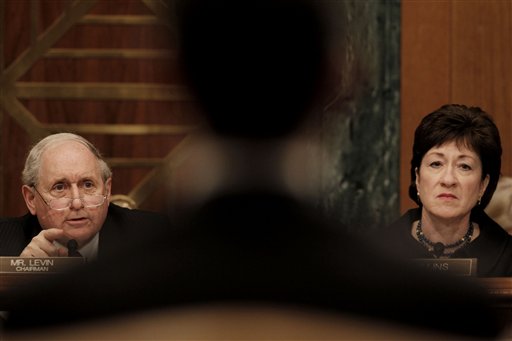Fiduciary standard for B-Ds dead and buried? Not so fast. During the grilling of Goldman Sachs execs in Congress today, a key Republican senator raised the issue again
In an indication of rising bipartisan anger toward The Goldman Sachs Group Inc., a Republican senator today grilled current and former officials of the bank about whether they cared more about the firm's profits than the welfare of their clients.
During a much-anticipated — and often contentious — hearing of the Senate Permanent Investigations Subcommittee, Sen. Susan Collins, R-Maine, zeroed in on the topic of fiduciary standards, which has been overshadowed in the recent debate on financial regulatory reform.
“I raised what I think is an essential issue, and that is whether Goldman Sachs is acting in the best interest of their clients and whether there should be a fiduciary obligation imposed on broker-dealers, imposed on the large investment companies,” Ms. Collins told reporters as she departed the hearing.
In the session today, the committee examined whether Goldman Sachs misled its clients by selling them collateralized debt obligations based on shaky mortgages, while purportedly shorting the housing market for its own accounts. The firm also is the subject of a Securities and Exchange Commission lawsuit alleging that the firm misrepresented how the CDOs were created.
The first to testify before the committee were current and former Goldman officials who asserted that they only took short positions to reduce the amount of risk the firm was carrying, not to make a bet on the direction of the market. Goldman Sachs chairman and CEO Lloyd Blankfein is scheduled to testify later this afternoon.
Part of the conflict of interest between Goldman Sachs and its clients, Ms. Collins asserted, arises from the fact that the investment bank staff doesn't have to adhere to the same ethical standards as investment advisers, who must fulfill fiduciary obligations.
The Goldman Sachs witnesses on the first panel maintained that the company had acted ethically, although most didn't respond directly to Ms. Collins' questions.
“We have a duty to serve our clients well,” said Daniel Sparks, who was head of the Goldman Sachs mortgage department from late 2006 until mid-2008.
Fabrice Tourre, an executive director of Goldman Sach's structured-products group in London, said that the firm's role was to be a market maker. “I do not believe that we were acting as investment advisers,” said the trader, who, along with Goldman, was named in the SEC suit filed last
In his testimony today, Mr. Tourre said that none of his clients were “individual, retail investors.” Rather, he said, they were “sophisticated financial institutions.”
The Senate financial reform bill does not impose a fiduciary standard on broker dealers. Instead, it calls for the SEC to study the topic.
Ms. Collins is not yet ready to offer an amendment that would put fiduciary standard language into the Senate bill. “I am looking at that issue,” Ms. Collins told reporters. “I have to explore in more depth the consequences of having a fiduciary standard.”
Before the Senate can get to amendments, the financial reform bill must be brought to the Senate floor. On Monday, a vote to begin consideration failed, 57-41, because it did not garner the 60 votes required to overcome a Republican filibuster.
The Goldman Sachs hearing might increase political pressure on Republicans to move the bill forward. A moderate Republican, Ms. Collins is seen as a key vote.
She said that she supports financial reform but wants to improve the Senate bill. Republicans are pushing back at what they see as Democratic attempts to move the legislation too quickly.
“I do believe that we had the desired result of forcing bipartisan negotiations to produce a bill that could garner widespread, bipartisan support,” Ms. Collins said. “It's clear that the negotiations have not yet been completed.”







